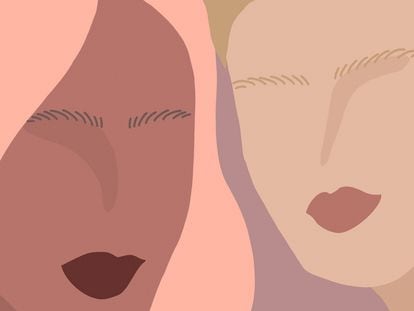Can jealousy be positive in a relationship?
Faced with a perceived threat, the emotion emerges as an expression of insecurity or fear. This can either spiral into controlling behavior or self-pity, or it can be used to examine what causes the insecurity in the first place
/cloudfront-eu-central-1.images.arcpublishing.com/prisa/GGFT4RX7RFHBXGOVTKMTXUKQDE.jpg)
Among 15 to 29-year-olds, 25% of men and 13.8% of women believe jealousy is a sign of true love, according to 2019 data from the Queen Sofia Center of Adolescence and Youth. This notion often leads to selfish, repressive and even violent behavior in relationships, as flagged up by sociologist Carmen Ruiz Repullo in her research The Myths of Romantic Love: Jealousy SOS. Rather than an expression of love, jealousy is a sign of distrust, control and possession. A negative rather than a positive emotion. But it is not always so black and white.
According to the 40dB survey on the perception of love, published last June for EL PAÍS, 54.2% of respondents stated that they never feel jealousy in their relationship. It is a figure that may seem unusually high, given the natural nature of jealousy, both in humans and in a number of animals. In other words, it is as normal to feel jealous as it is to feel shame, guilt, pride or pleasure.
Jealousy is an emotional response to a sense we have lost the attention of someone who matters to us. It can be reactive with a solid foundation or simply based on suspicion. It can surface when a new friendship absorbs time we usually expect for ourselves; or when a partner likes or comments on someone’s photo on social networks.
The behavior that can trigger jealousy varies greatly from person to person and across cultures, due to the diversity of human belief about what constitutes a relationship, what constitutes a threat to that relationship and what should be done to protect the relationship against threat.
We speak of normal jealousy and pathological jealousy to distinguish between feelings that can be considered valid and those that cannot. The latter, which can be either reactive or suspicious, is usually accompanied by insecurity, hostility, self-pity and excessive anguish, leading to compulsive tics, such as controlling partners or constantly checking on them. Gregorio Marañón rightly defined jealousy as “an accurate instrument that destroys inner freedom and eliminates all possible happiness for those involved.”
Taking something useful from jealousy
It is obvious that jealousy in its pathological manifestation is not romantic and invariably has negative consequences. If you want to build a healthy relationship, you have to get rid of this kind of jealousy, or at least reduce its intensity. But when it manifests itself as a natural, emotional reaction, perhaps it can actually be made to be useful.
After all, supposedly negative emotions such as anger, sadness, envy and disgust can be useful. Pixar’s computer animated movie Inside Out uses colors to help children get to know and recognize their emotions – knowledge that will help them to resolve situations. But sometimes it is a case of inverting the interpretation given to a certain emotion. Envy can provoke anger or hatred towards another person for wanting what he or she has, but it can also serve as a departure point for self-examination, prompting questions such as: what is it that we envy? – which may lead to the decision to try to attain that for ourselves, which, in turn, could lead to defining our challenges and objectives. By altering the interpretation, we can also alter the response.
Similarly, natural jealousy, which tends to be reactive, can offer an insight into areas that have been neglected in a relationship. If the jealousy is due to a lack of quality time spent together, then we can rectify that by ensuring we make more space in our lives for each other. If jealousy arises because our partner tends to comment on other people’s physiques, it may be that we have let ourselves go. Or the jealousy may simply be triggered by a lack of confidence in oneself; work in this area may help to get things in perspective.
When faced with a situation considered threatening, jealousy can be an expression of insecurity or fear, leading then to controlling or self-pitying behavior. But it can also prompt exploration into what is causing the insecurity and fear, and this can help to strengthen the relationship and to improve the wellbeing of the person experiencing the jealousy. How you react to the emotion is key.
It is not always easy to turn jealousy into something positive. The intensity, the situation, the personality and the type of relationship can all be at play. Emotions make us human, and our rational brain sometimes cowers in the face of them. But understanding them and wanting to change them will bring us closer to being able to control “the green-eyed monster,” as Shakespeare defined it.












































